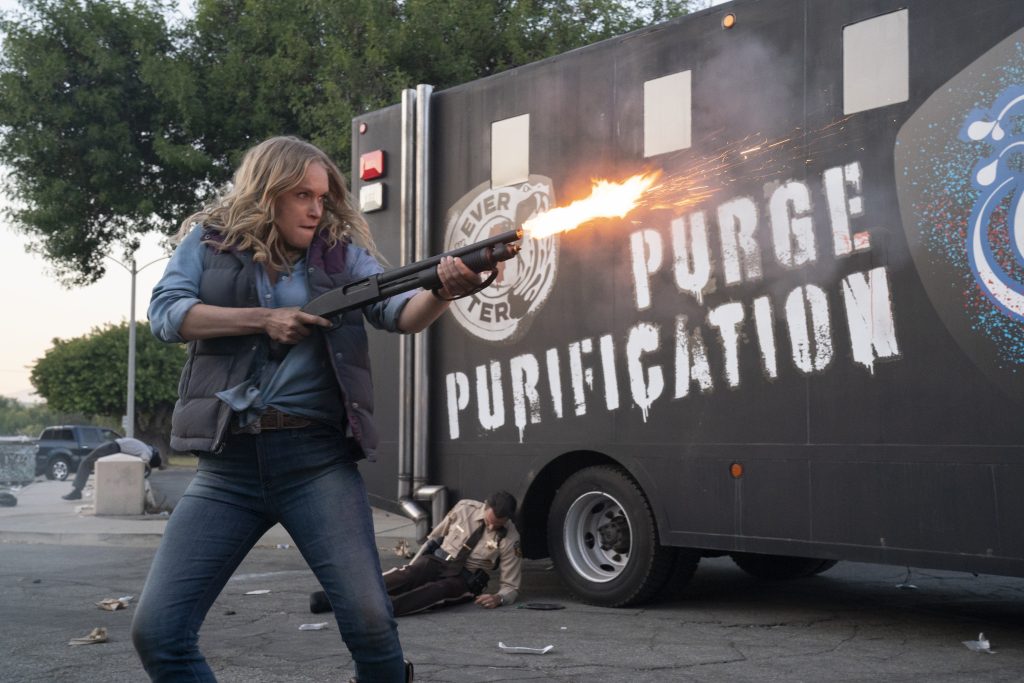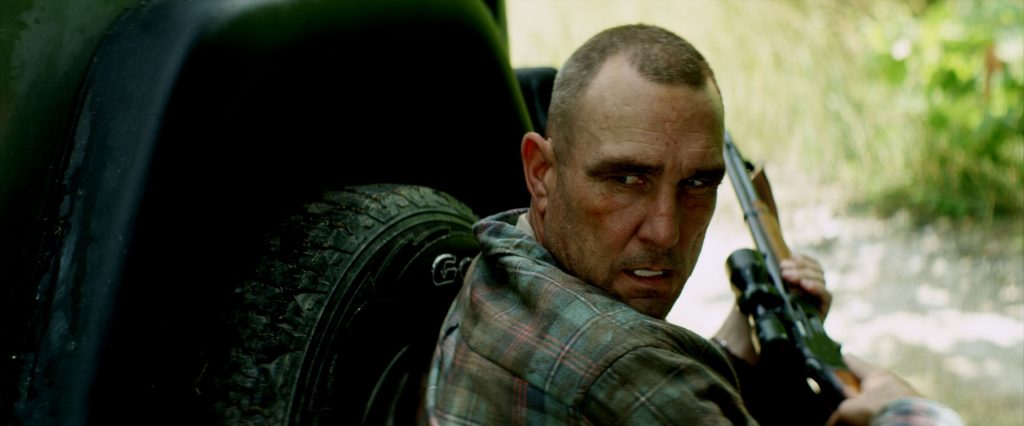June 30, 2021
by Carla Hay

Directed by Everardo Valerio Gout
Some language in Spanish with subtitles
Culture Representation: Taking place in Texas and Mexico, the horror film “The Forever Purge” features a cast of mostly Latino and white people (with a few black people and Native Americans) representing the wealthy, middle-class and working-class.
Culture Clash: Two families—one wealthy and white, the other working-class and Mexican—try to stay alive when a violent mob of white supremacists go on a killing spree targeting people who aren’t white and people who don’t agree with the mob.
Culture Audience: “The Forever Purge” will appeal primarily to people who want to see formulaic, violent movies that have the worst racist hate crimes as gimmicks.

Completely predictable and lacking in substance, “The Forever Purge” tries to come across as a horror movie with a social conscience about racism. The movie is really just a badly written gorefest that uses racist hate crimes as a hook. The heroes in the movie have forgettable personalities, while the villains are so over-the-top with their hate speech that they seem almost like a cringeworthy parody of racism. The violence in the movie becomes so repetitive that it lessens any intended impact of being surprising or scary.
“The Forever Purge” is the fifth movie in the horror series that began with 2013’s “The Purge” and continued with 2014’s “The Purge: Anarchy,” 2016’s “The Purge: Election Year” and 2018’s “The First Purge.” The basic premise of each movie is that in a fictional version of the United States, all crime is legal once a year on a designated day, for a 12-hour period. The 12-hour legal crime spree is from dusk until dawn. This legal crime period is called the Purge, because the idea is that if people who are inclined to commit crimes had one day a year to purge their worst actions out of their system, then crime would decrease for the rest of the year. During the Purge, police and other emergency services are not available.
It’s a concept for a horror franchise (which also spawned the 2018-2019 “The Purge” TV series) that has been stretched so thin, that now “The Forever Purge” has ripped that concept apart. In “The Forever Purge,” which takes place mostly in Texas, the 12-hour legal crime period still happens. However, a group of white supremacist marauders have decided that the Purge will no longer have a time limit for them, as they continue with their crime spree to hunt and kill people who aren’t white. These rogue racists have a particular hatred for non-white immigrants.
Directed by Everardo Valerio Gout and written by James DeMonaco (who has written all “The Purge” movies so far), “The Forever Purge” has two protagonist families who represent two different versions of the American Dream. One is a white family who has lived in the United States for generations and has accumulated wealth. The other is a Mexican immigrant family who has relocated to the U.S. in search of better opportunities and a safer life.
The Tucker clan is a family of ranchers living in a large compound in an unnamed Texas city that’s near the Mexican border. Widowed patriarch Caleb (played by Will Patton) is a kind and generous boss to the ranch’s employees, who are mostly Mexican immigrants. Caleb’s son Dylan (played by Josh Lucas) is mistrustful of people who aren’t from the same racial and social class as he is.
Caleb’s other child is his daughter Harper (played by Leven Rambin), who is more like her father than Dylan is, because she doesn’t have racist tendencies. Dylan and his wife Cassie (played by Cassidy Freeman) are expecting their first child together. They don’t know yet what gender the child is, but Cassie is about eight or nine months pregnant.
Meanwhile, a Mexican couple in their 30s named Adela (played by Ana de la Reguera) and Juan (played by Tenoch Huerta) have crossed over the border into Texas as undocumented immigrants in search of the American Dream. They are also seeking a safer place to live, since where they used to live in Mexico has been overrun with drug cartels. Juan finds work as a ranch hand at the Tucker ranch. Adela becomes a cook at a restaurant.
Early on in the movie, it’s shown that Dylan is a jerk who thinks Mexicans are inferior. He likes to wrongfully accuse the Mexican workers of committing an employee violation, and he threatens to fire them to instill fear into them. One of the Mexican workers is a young man named T.T. (played by Alejandro Edda), who is Juan’s closest friend at the ranch.
Dylan has a particular dislike of Juan, who is kind of like a “horse whisperer” for the ranch. There’s a scene near the beginning of the movie that shows how Dylan tried and failed to get a stubborn horse under his control during training, and the horse knocked Dylan to to ground. However, Juan was able to easily calm the horse into submission.
Caleb respects Juan, who is a responsible and hard-working employee, and that makes Dylan jealous of Juan. Dylan tries to intimidate Juan with a false accusation of being tardy, but Juan remains unrattled. However, it’s the type of harassment that Juan can longer tolerate. Juan tries to talk to Caleb about Dylan’s animosity, by candidly telling Caleb that he thinks that Dylan doesn’t like Mexicans.
Caleb’s denies it and says, “I always taught my son to be a proud American. Maybe I didn’t really teach him what that meant. I don’t even know what that means anymore. The world is changing all around us. We are at each other’s throats. Confusing times.”
“The Forever Purge” keeps hammering this point with all the subtlety of a jackhammer on full blast. Within the first 10 minutes of the movie, there’s a series of news voiceovers that report how issues over Mexican immigration have caused increasingly violent tensions in the United States. White supremacist hate crimes, which the perpetrators try to disguise as “patriotism,” are on the rise against non-white immigrants.
As a result, the U.S. government has re-instated the Purge, which had been banned at the end of “The Purge: Election Year.” (“The First Purge” was a prequel to “The Purge.”) All crimes will still be legal for the designated 12-hour period, but government officials are not allowed to be crime victims during the Purge. It’s a precaution to prevent any assassinations of high-ranking leaders.
This re-instated Purge will begin 10 months after Adela and Juan have arrived in the United States. In the days leading up to this Purge resurrection, an anti-Purge activist named Chiago Harjo (played by Zahn McClarnon), who’s identified in the media as a “Texas tribal leader,” has been giving TV interviews denouncing the Purge. And that’s how “The Forever Purge” makes it easy to know that Chiago is going to end up joining forces with the movie’s protagonists in fighting the racist villains of the story.
On the day before the Purge begins again, Dylan, Cassie and Harper are having dinner with two friends who are a married couple: Dalton Levay (played by Joshua Dov) and Emily Levay (played by Annie Little). Earlier that day, Dalton had invited Dylan and Cassie to stay with the Levay family during their Purge lockdown, but Dylan declined the offer. His reason? “I hate the damn Purge. It’s hard to be social on that night, but thank you for the invite.”
During dinner, Emily says that if Cassie and Dylan need a nanny for their soon-to-be-born child, then she suggests hiring the sister of Emily’s nanny Anna. Dylan declines that offer too, because he says that they don’t need a nanny. Anna (played by Lupé Carranza) happens to be nearby with one of the Levay kids, and Dylan notices that Anna and the child are speaking Spanish to each other.
Dylan blurts out another reason why he doesn’t want Anna’s sister to be a nanny for him and Cassie: “I don’t know if I want our kids to be speaking Spanish in this house.” Cassie, Harper and Emily look shocked and embarrassed at this bigoted comment. However, Dylan is the type of racist who doesn’t think he’s racist.
As he says later in the movie to Juan: “I don’t think white people are better than anyone else … but we should just stick to our own.” It’s the type of racist mindset that historically has made racial segregation legal, by saying that society should be “separate but equal” when it comes to race. The problem with the “separate but equal” argument is that the U.S. was built on the very unequal system of white supremacy, where slavery and racial segregation were legal, and white people were given better access to resources such as education, housing, job opportunities and health care.
It’s easy for someone like Dylan (who’s already wealthy) to say “separate but equal” when he has privileges that give him more advantages in life than people who don’t have the same privileges. It’s a message that “The Forever Purge” attempts to convey in a very superficial manner. “The Forever Purge” ultimately abandons this message when the movie devolves into a typical violent free-for-all with deadly shootings, stabbings and other types of violent murders.
The day before the Purge, Caleb gives each of the ranch employees a cash bonus, to help them fund whatever defense methods they need for the Purge. A ranch hand named Kirk (played by Will Brittain), who appears to be the only white employee of the Tucker family, snarls after taking the cash: “I know what I’m using my money for—and it’s not for protection.” And when Kirk gripes to the other ranch hands that the Tucker family is just using the employees as “slave labor,” it’s an obvious foreshadowing of what comes later in the movie when the Tuckers become victims of a home invasion.
During the Purge, the Tucker family is on lockdown by having bulletproof barriers that can be lowered over their doors and windows. The Tucker property also has an extensive video surveillance system that Dylan monitors. Meanwhile, Adela and Juan stay at a public lockdown facility that is protected by armed guards. There seem to be many other Spanish-speaking immigrants at this facility.
Adela is curious about what Purge night looks like outside, so she goes up on the building’s roof where some armed guards are keeping vigil. One of the guards advises her to go back inside the building, as the sounds of gunshots and explosions ring through the air. Adela says to him, “There are parts of Mexico that sound like this every night.”
While looking out on the streets below, Adela is alarmed to see a truck with the words “Purge Purfication” emblazoned on the side. A recording blares from the truck’s loudspeakers: “We will no longer tolerate foreigners raping and pillaging the United States of America! We will find you and disinfect you! America will be American once again!”
She also sees that there’s a black man being held captive inside the truck. He looks like he’s being assaulted and will probably be killed. However, the crime that Adela is witnessing is legal, because it’s happening during the Purge. The tragedy of the situation still shocks her though.
Later, when Adela shows weapons skills that a typical cook would not have, it should come as no surprise when she reveals that it’s because when she was in Mexico, she was part of a group of women who fought drug cartels. This isn’t spoiler information, because the only real spoilers for this obvious movie is revealing who lives and who dies during the violent mayhem that ensues.
After the Purge ends for the year, people think their lives have gone back to normal. But there would be no “The Forever Purge” movie if that happened. Not long after the Purge ends, there’s still a large presence of white supremacists going around in groups and committing hate crimes. The Purge Purification truck is part of a nationwide Purge Purification movement that doesn’t want the Purge to end. Their motto (which they repeat to the point of stupidity) is “Forever After Purge.”
Adela finds out the hard way when she sees an abandoned goat in a cage in a back alley and tries to rescue it. It’s a trap, of course, and the two white supremacists who set the trap try to kill her. Adela is saved by a Good Samaritan named Darius (played by Sammi Rotibi), who is African American. Together, Darius and Adela kill their attackers in self-defense.
And as soon as this deadly battle ends, guess who suddenly shows up at the scene? Two cops, who weren’t around when they were needed. The cops quickly arrest Adela and Darius, who protest and say they were acting in self-defense. Their proclamations of innocence are ignored, so Adela and Darius end up in the back of a police van with some other people who’ve been arrested.
One of those other people just happens to be a mentally unhinged neo-Nazi skinhead (played by Edward Gelhaus), who has a swastika tattooed on his left cheek. By this time, the city has become a chaotic and violent mess, with gunshots heard everywhere. In one of the more laughably ludicrous parts of the movie, the neo-Nazi begins identifying the types of guns being used, based on the gunshots that are heard.
“Listen to that bass!” the Nazi crows like a loon about the gunshots. “Homegrown music from the heartland right there! That’s American music, motherfucker!” Yes, it’s that kind of movie.
Every lunatic racist group in a movie like this needs a leader, and in “The Forever Purge,” it’s Elijah Hardin (played by Jeffrey Doornbos), who spouts white supremacist rhetoric that sounds like it came straight from the Ku Klux Klan Handbook of Clichés. Elijah has an equally nasty wife named Mother Hardin (played by Susie Abromeit), who’s intent on proving that women can be just as dangerous as men when it comes to violent racism.
“The Forever Purge” has a very unsurprising storyline of the protagonists being separated from their spouses and trying to find them in the chaos. And that means that Dylan and Juan end up working together for a common goal, which leads to Dylan’s inevitable change of heart in how he feels about Mexicans. There’s also a part of the movie where the protagonists trie to flee to safety in Mexico, which is an obvious ironic flip to show Americans what it would be like to be refugees seeking asylum in another country.
The violence just becomes filler before the movie’s hackneyed conclusion. “The Forever Purge” has a lot of action, but it’s so unimaginative and easy to predict that it ends up becoming very tedious after a while. The acting is nothing spectacular, mainly because almost all of the characters have no real depth and often utter moronic dialogue during the fight scenes. Now that “The Forever Purge” filmmakers have destroyed the series’ original concept so that the mayhem of the Purge now has no time limit, this once-unique movie franchise has just become another run-of-the-mill slasher flick series.
Universal Pictures will release “The Forever Purge” in U.S. cinemas on July 2, 2021.


